Waiving clinical trials for proven drugs can benefit India if done with precautions
India must check whether the clinical trials of proven drugs had adequate South Asian representation, and also be open to more clinical trials
The Indian government has recently proposed a waiver on clinical trials for proven drugs, if the drug has been approved and marketed (with no major adverse effects on patients) for at least two years in the European Union, United Kingdom, United States, Australia, Canada, and Japan. This decision is aimed to speed up the availability of new drugs in the Indian pharmaceutical market and to reduce the cost of drugs.

It has already shown a positive impact on the Nifty pharma index, which gained 1.2% yesterday. Given that the Indian trials for regulatory purposes were small, largely addressing safety issues and not outcomes, this proposal is a welcome step in stopping these meaningless trials and should be appreciated. While this is a welcome step in making available new drugs to the Indian public, the government should consider a few caveats prior to formulating and incorporating these new rules into the Indian Drugs and Cosmetics Act.
First, it is well established that the efficacy of new drug varies across ethnicities. South Asians respond differently to the dose of many antibiotics, anti-platelets, blood pressure and cholesterol lowering drugs. So, it is important to critically review the representation of South Asian ethnicity in the clinical trials conducted in these chosen countries, based on which the government has proposed to abolish the need of local clinical trials in India.
For example, to date, there is no evidence of clinical superiority of some of the anti-hypertensive drugs used among Indians. We have been following western guidelines which till very recently recommended the use of beta-blockers as first line drugs for hypertension treatment. Given that Indians have a higher propensity for diabetes, are physically inactive and have low levels of HDL-cholesterol (good cholesterol), b-blockers intuitively would be an inappropriate choice. We only recently learnt that some b-blockers lack cardiovascular protection, and cause significant adverse effects, including an increased rate of type 2 diabetes.
Another example is the most widely used cholesterol-lowering drug — statins, and South Asians respond to a very low dose of statins. There are several such examples including the hyper-responsiveness to statins and increased risk of bleeding for Indians with some of the blood thinners. Therefore while we give instant access to new drugs we should also be careful in asking if sufficient number of people of Indian or South Asian ethnicity were represented in these global trials.
Second, India as a country needs to participate in major clinical trials (of course with appropriate regulations to protect human subjects) to avoid the above pitfalls. Further, we also need to look at pricing to give equitable access medications.
Addressing these issues (different ethnicity, and priorities) will remove considerable hurdles to both local and international clinical trials, accelerate the pace of research and development, and create a quality environment for effective and less costly drugs to emerge.
By doing so, India will take one important step to move to the forefront of clinical trials. The government must, on the one hand, strengthen its regulatory apparatus to ensure safe and effective drugs are approved and on the other hand encourage the rational, safe, and smart prescription of medicines by healthcare professionals in India.
D Prabhakaran is vice president, Research and Policy, Public Health Foundation of India, New Delhi
The views expressed are personal



